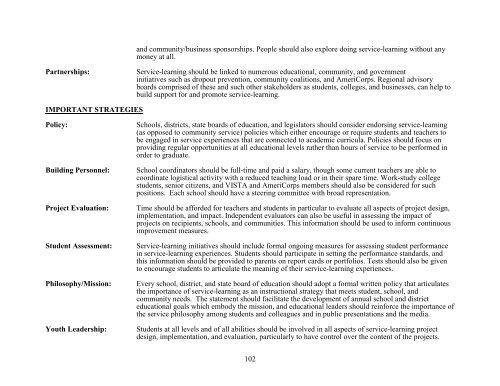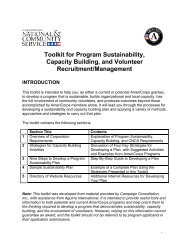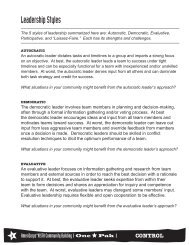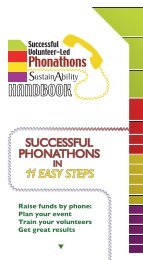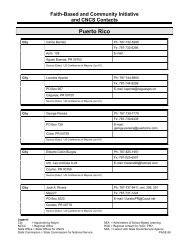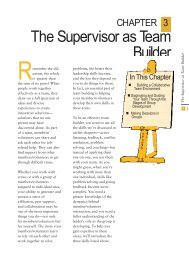MAKE IT LAST FOREVER: THE ... - National Service Resource Center
MAKE IT LAST FOREVER: THE ... - National Service Resource Center
MAKE IT LAST FOREVER: THE ... - National Service Resource Center
Create successful ePaper yourself
Turn your PDF publications into a flip-book with our unique Google optimized e-Paper software.
Partnerships:<br />
IMPORTANT STRATEGIES<br />
Policy:<br />
Building Personnel:<br />
Project Evaluation:<br />
Student Assessment:<br />
Philosophy/Mission:<br />
Youth Leadership:<br />
and community/business sponsorships. People should also explore doing service-learning without any<br />
money at all.<br />
<strong>Service</strong>-learning should be linked to numerous educational, community, and government<br />
initiatives such as dropout prevention, community coalitions, and AmeriCorps. Regional advisory<br />
boards comprised of these and such other stakeholders as students, colleges, and businesses, can help to<br />
build support for and promote service-learning.<br />
Schools, districts, state boards of education, and legislators should consider endorsing service-learning<br />
(as opposed to community service) policies which either encourage or require students and teachers to<br />
be engaged in service experiences that are connected to academic curricula. Policies should focus on<br />
providing regular opportunities at all educational levels rather than hours of service to be performed in<br />
order to graduate.<br />
School coordinators should be full-time and paid a salary, though some current teachers are able to<br />
coordinate logistical activity with a reduced teaching load or in their spare time. Work-study college<br />
students, senior citizens, and VISTA and AmeriCorps members should also be considered for such<br />
positions. Each school should have a steering committee with broad representation.<br />
Time should be afforded for teachers and students in particular to evaluate all aspects of project design,<br />
implementation, and impact. Independent evaluators can also be useful in assessing the impact of<br />
projects on recipients, schools, and communities. This information should be used to inform continuous<br />
improvement measures.<br />
<strong>Service</strong>-learning initiatives should include formal ongoing measures for assessing student performance<br />
in service-learning experiences. Students should participate in setting the performance standards, and<br />
this information should be provided to parents on report cards or portfolios. Tests should also be given<br />
to encourage students to articulate the meaning of their service-learning experiences.<br />
Every school, district, and state board of education should adopt a formal written policy that articulates<br />
the importance of service-learning as an instructional strategy that meets student, school, and<br />
community needs. The statement should facilitate the development of annual school and district<br />
educational goals which embody the mission, and educational leaders should reinforce the importance of<br />
the service philosophy among students and colleagues and in public presentations and the media.<br />
Students at all levels and of all abilities should be involved in all aspects of service-learning project<br />
design, implementation, and evaluation, particularly to have control over the content of the projects.<br />
102


